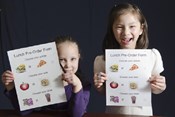Students who pre-order their school lunches are more likely to pick healthier dishes, according to a new study by the Food and Brand Lab.
Skipping meals can sabotage your shopping – and your diet, according to a new Cornell study.
Even short-term food deprivation not only increases overall grocery shopping, but also leads shoppers to buy 31 percent more high-calorie foods, according to a paper published online in JAMA Internal Medicine May 6.
In one study, 68 meal skippers were either given food (wheat crackers) to reduce their hunger or not given any food following a five-hour fast, and then asked to make purchases at a simulated grocery store. The hungry shoppers who did not eat the crackers bought almost 19 percent more food, including 31 percent more high-calorie snacks.
At a follow-up study, researchers observed 82 late afternoon shoppers at an actual grocery store during the hours between lunch and dinner, when people tend to be hungry, and the hours just after lunch, when people tend to be satiated. Late-afternoon shoppers purchased fewer low-calorie foods proportionate to their overall purchases than those shopping after lunch.
“People skip meals for all sorts of reasons – dieting, fasting, insane schedules that make you forget to eat,” said lead author Aner Tal, a postdoctoral researcher in the Cornell Food and Brand Lab. “But it doesn’t matter why you skipped a meal, it can still make your nutritionist cry, making you buy more potato chips and ice cream, and less baby carrots and skim milk.”
Co-author Brian Wansink, professor in the Charles H. Dyson School of Applied Economics and Management, advises people to have a snack before shopping.
“Make sure you don’t skip a meal, or at least have a snack like apples or string cheese in your office,” Wansink said. “Breakfast is the most skipped meal, and even having something for lunch that has protein will cut your hunger edge.”
Hunger in the school cafeteria can also lure children into making unhealthy food choices, according to postdoctoral researcher Andrew Hanks.
His research, published online in JAMA Pediatrics May 3, found that students who pre-ordered their school lunches were more likely to pick healthier dishes.
Children from 14 classrooms from two elementary schools in upstate New York participated in the study; 29 percent of the 272 students selected the healthier entrée when pre-ordering, compared with 15 percent when preordering was not available.
“Students who selected their entrée in the lunch line, where decisions are biased by aromas and sights of tasty, less healthy foods, decreased selection of healthy entrees by 48 percent and increased selection of less healthy entrées by 21 percent,” Hanks said.
The research was funded as part of a grant from the U.S. Department of Agriculture to the Cornell Center for Behavioral Economics in Child Nutrition Programs.







